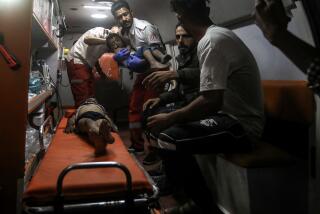Ivory Coast Warplanes Attack French Troops
Government warplanes attacked French troops in rebel-held northern Ivory Coast on Saturday, killing nine of them and an American relief worker, and sparking a dangerous escalation of violence in the West African country.
The French, former colonial rulers who are helping enforce a 2003 truce that ended an Ivorian civil war, struck back by attacking government aircraft on the ground. Mobs roamed the streets of Abidjan, the country’s main city, searching for French civilians. French schools in Abidjan and the capital, Yamoussoukro, were burned. Some civilians had to be evacuated by helicopter.
Protesters armed with machetes, axes and other weapons also tried to storm a French military base. French forces fired shots into the air and tear gas to control the mob.
French President Jacques Chirac ordered more soldiers and warplanes to the area. In New York, the United Nations Security Council demanded an immediate end to all military action. It said that peacekeepers -- 4,000 French troops and a separate international force of about 6,000 -- were authorized to use “all necessary means” to carry out their mandate.
As night fell, there were reports of explosions in the capital, where both French and Ivorian soldiers are based.
Ivory Coast was one of the region’s success stories until 1999, when a coup ushered in a period of instability. Another coup attempt in September 2002 launched the country into outright civil war. The rebels and the army signed a peace deal in May 2003, splitting the country into a rebel-held north and government-controlled south. Although peacekeepers were deployed, political stability has proved elusive as various disarmament and power-sharing deals have collapsed.
The two sides began sliding back toward war after they missed an Oct. 15 deadline to disarm. The rebels, known as the New Forces, withdrew from the power-sharing government last week.
Government forces have attacked rebel forces in northern Ivory Coast in the last three days, breaking a cease-fire signed last year, and vowing to retake the north. The African Union strongly condemned the attacks. The U.N. estimated that 22 people were killed Friday, including 20 civilians.
France is unpopular because of its role in pressing the government to sign the truce and for its current peacekeeping mission. The attack that killed the French soldiers occurred near Bouake in central Ivory Coast.
French officials said about 20 soldiers wounded in the air attack had been evacuated.
The American killed was not immediately identified. The U.S. Embassy warned American citizens throughout the country to stay indoors.
Chirac ordered 300 troops to reinforce the French contingent. in Ivory Coast. Three French Mirage warplanes based in Chad were ordered to Gabon, which is closer to Ivory Coast.
French troops also clashed with government forces at the Abidjan airport after Ivory Coast soldiers reportedly tried to attack French aircraft.
As mobs rampaged, a spokesman for Ivory Coast President Laurent Gbagbo called for restraint.
“Pending an investigation into these incidents, the president of the republic has asked that all Ivorian men and women, even if they are angry about what happened, do not attack foreign goods and businesses, and in particular that nobody attack French interests,” Desire Tagro, the spokesman, said.
Military and government officials were quoted by the Associated Press and Reuters news agencies as saying the attack on the French base in northern Ivory Coast was an accident. The attack was aimed at nearby rebels, they said.
The French air attack destroyed two Sukhoi-25 warplanes and an MI-24 helicopter on the ground at Yamoussoukro.
French Defense Minister Michele Alliot-Marie warned that the French government held Gbagbo personally responsible for maintaining order in his country. Foreign Minister Michel Barnier demanded firm action from Gbagbo, saying he should “clearly assume his responsibilities and the role that is his to return the country to calm, especially in Abidjan. “We must immediately return to the path of peace,” Barnier said.
Aid group Doctors Without Borders pulled out some staff in the west of the country Saturday.
*
Times staff writer Sebastian Rotella in Paris contributed to this report.
More to Read
Start your day right
Sign up for Essential California for news, features and recommendations from the L.A. Times and beyond in your inbox six days a week.
You may occasionally receive promotional content from the Los Angeles Times.






